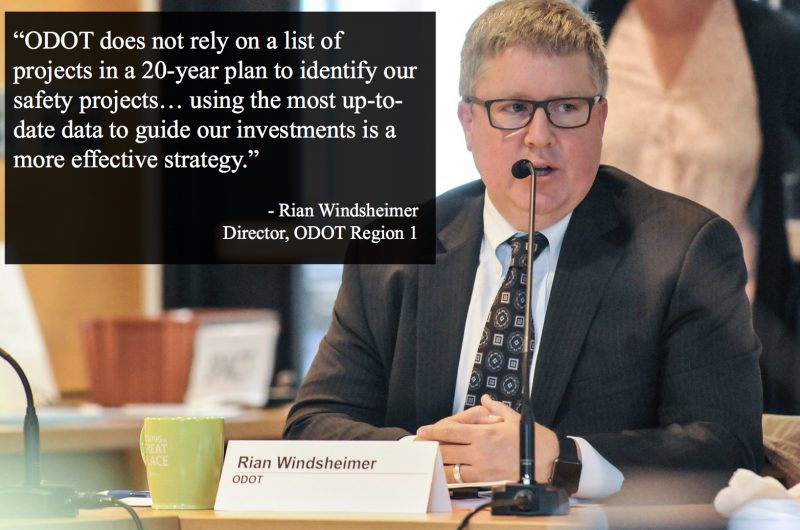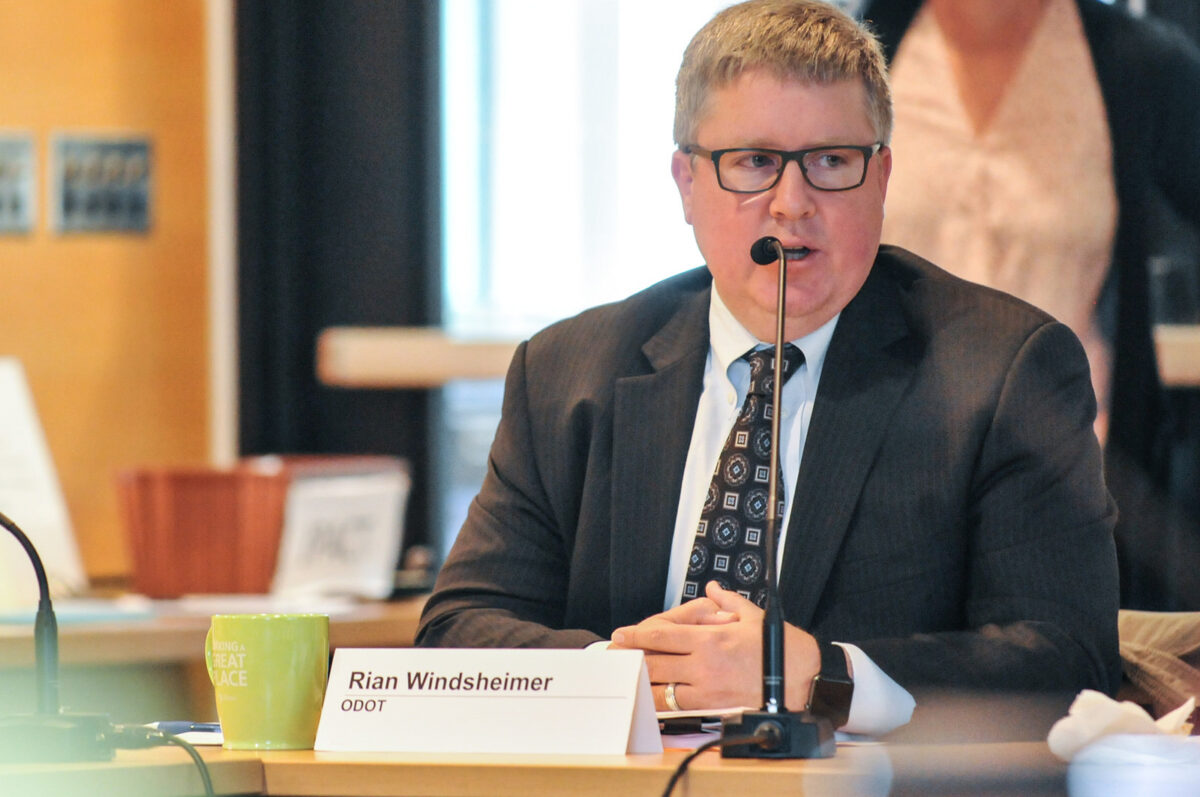
The politics around 82nd Avenue have changed. And ODOT hasn’t.
That fact has put the state transportation agency in hot water with local and regional elected officials.
Late last month Portland Mayor Ted Wheeler and nine other politicians — including his council colleagues, Multnomah County commissioners and state legislators — skewered ODOT for their, “lack of stewardship and prioritization of state highways.”
At issue is 82nd Avenue, one of the state’s “orphaned highways” that gets managed like a freeway; but also happens to be a neighborhood street that people want to use on foot, by bike, and with transit safely and efficiently. Wheeler and a growing coalition of agencies, advocacy groups and electeds, are demanding that ODOT insert a major 82nd Avenue improvement project into the Regional Transportation Plan (RTP). That move is considered a critical step in the process of transferring jurisdiction of 82nd from ODOT to the City of Portland. (It’s a widely accepted view that orphaned highways like 82nd should be owned and managed by the Portland Bureau of Transportation, not by ODOT, because of the former’s expertise in modern multimodal road design practices and the latter’s reluctance to implement them.)
“Because ODOT applies highway design standards to 82nd Avenue, ODOT has limited ability to bring 82nd Avenue to City of Portland and community standards.”
— State Rep. Alissa Keny-Guyer and State Sen. Michael Dembrow
The RTP project list is being negotiated now for final adoption in the new few months. If 82nd Avenue is not included, it will be difficult to coalesce the political and public support needed to find the large chunk of funding it will take to transform the street from a car-centric arterial to a more human-scale, people-friendly street that truly serves the community around it.
ODOT Region 1 Director Rian Windsheimer has issued his own letter (PDF) in response where he defends his agency and criticizes Metro’s RTP process.
Windsheimer first says ODOT also wants to eliminate fatal and serious injury crashes, “especially for vulnerable users” and then he details the projects ODOT has completed on 82nd in the past decade. Then it gets interesting. Windsheimer sticks up for ODOT’s approach to safety project implementation and then goes a step further, seeming to question Metro’s process.
Here’s an excerpt from his letter:
“It’s important not to confuse ODOT’s commitment to safety and our investments and safety with projects programmed in Metro’s RTP. The Oregon Transportation Committee allocates safety funding every STIP [Statewide Transportation Improvement Program] cycle, and the department conducted a very extensive all roads (city, county and state) safety analysis to program those safety projects where they have the highest probability for reducing fatal an injury crashes across all modes, including bike and pedestrian. ODOT does not rely on a list of projects in a 20-year plan to identify our safety projects; we use the latest available safety data to program real projects with real dollars to improve safety within that three to four year STIP cycle. Safety hotspots change from year-to-year and using the most up-to-date data to guide our investments is a more effective strategy.”
Windsheimer urges regional governments to support ODOT STIP projects that will bring 82nd up to an acceptable threshold. In essence, Windsheimer wants ODOT to maintain control of 82nd as long as necessary to make required improvements, but everyone else around the table has seen enough. There’s a prevailing sense that ODOT has had plenty of time and chances and they’re not doing the right projects — fast enough — to respond to demands for change.
At a meeting of Metro’s Joint Policy Advisory Committee on Transportation Thursday morning, the issue was once again in the spotlight. Oregon House Representative Alissa Keny-Guyer (District 46) and Senator Michael Dembrow (District 23) issued new testimony. Based on a letter dated April 18th (PDF), Keny-Guyer and Dembrow have ratcheted up the pressure on ODOT even further.
Advertisement
In a polite way, the legislators called out ODOT for not doing enough to solve the myriad problems with 82nd Ave. The letter referred to ODOT’s recently completed 82nd Avenue of the Roses Implementation Plan, which was supposed to “build toward community goals.” (John Mulvey, who served on an advisory committee for that project, told us, “ODOT was never serious about making 82nd Avenue safer for pedestrians and they were willing to waste 2-1/2 years of the community’s time in order to make it look like they were doing something without really doing something.”)
“While we appreciate the work that has gone into the ODOT report,” the letter states, “the result does not support our community vision. For example, the report offers “enhanced crossings,” which are simply refugee islands in areas of high traffic volumes without any crosswalks or pedestrian activated signals. The report acknowledges that sidewalks along 82nd Avenue need improvement, but stipulates they be built to ODOT standards of 6 feet wide. Community standards articulate a sidewalk width of 9 or more feet. Because ODOT applies highway design standards to 82nd Avenue, ODOT has limited ability to bring 82nd Avenue to City of Portland and community standards.”
Rep. Keny-Guyer and Senator Dembrow make it crystal clear they do not trust ODOT with 82nd. “We seek an expedited transfer of ownership of 82nd Avenue from the State of Oregon to the City of Portland,” they write. “It is critical that this process get underway as soon as possible, BEFORE ODOT spends funds to make improvements that are not aligned with our vision.” They want a “shared funding” plan between the State of Oregon and the City of Portland that will, “allow the City to design and transform 82nd Avenue with community input.”
They even lay down minimum expectations for the future of 82nd. They call for, “full modernization, including significant upgrades to pedestrian infrastructure and traffic calming; bicycle path on a street parallel to 82nd Avenue; accommodation for increasing density; and a commitment to affordable housing and anti-displacements strategies.”
“Something is broken if elected leaders have to petition an administrative arm of the state government to take action.”
— Gerik Kransky, The Street Trust
The Street Trust Advocacy Director Gerik Kransky is following all this closely. He too thinks 82nd Avenue should be prioritized in Metro’s RTP. Kransky notes it has taken years of advocacy, countless injuries and fatalities, adoption of Vision Zero policies, and more public awareness of traffic safety issues in general, to finally put ODOT on the spot. “Now there’s just more accountability,” he shared in a recent interview. “And something is broken if elected leaders have to petition an administrative arm of the state government to take action.”
Kransky says even if ODOT refuses to put 82nd in the RTP, he wants to know what their plan is to bring it up to modern design standards. “What’s the investment strategy to get us there?” he wonders. “Who’s going to put money toward it and when can we expect it to be completed. We need action.”
What Portland and many regional electeds and advocates want are more transformative changes to 82nd. And so far, ODOT is simply doing business-as-usual — a curb ramp here, a flashing beacon there. And until ODOT hands over management authority, few people think anything will change.
“I feel like we’re an an impasse,” Kransky says. He also thinks this moment in time is “a wide open door that transportation activists should walk through.” “It will be that community outcry that helps us focus people’s attention.” Asked if The Street Trust has immediate action plans, Kransky said not yet, but they’re working on something.
In the 2017 legislative session, lawmakers pledged $110 million to another orphaned highway, Powell Blvd. If can happen there, surely it can happen here.
— Jonathan Maus: (503) 706-8804, @jonathan_maus on Twitter and jonathan@bikeportland.org
Never miss a story. Sign-up for the daily BP Headlines email.
BikePortland needs your support.


